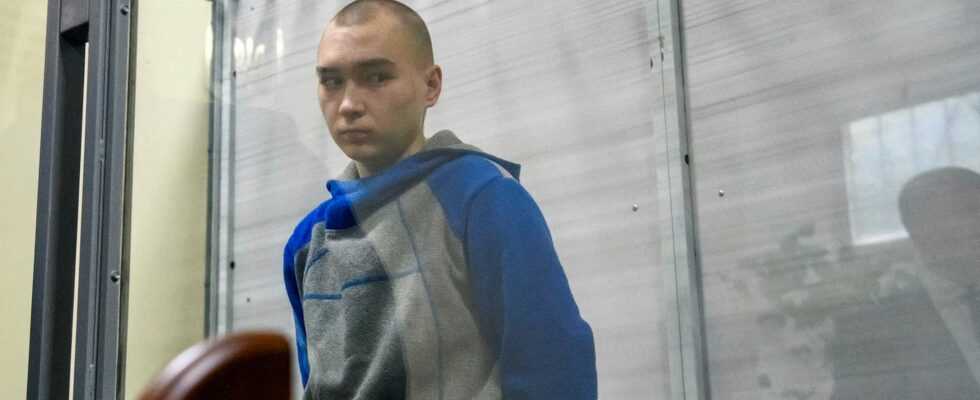A Russian serviceman has pleaded guilty to shooting dead a Ukrainian civilian, at the start of the first war crime trial since the Russian invasion of Ukraine.
A Russian soldier pleaded guilty on Wednesday to shooting dead a Ukrainian civilian before a court in kyiv where the first war crime trial since the entry into Ukraine of troops from Moscow is being held.
Shaved head and dressed in a khaki and blue hooded sweatshirt, Vadim Chichimarine, 21, was transferred at the beginning of the afternoon to the Solomiansky district court in kyiv, where he appeared locked in a glass box.
To read : War crimes in Ukraine, the hunt for executioners is open
After the prosecutor read the indictment, the judge asked him if he admitted the facts. “Yes,” he replied.
– “In their entirety?”, continued the magistrate.
– “Yes”.
Accused of war crimes and premeditated murder, the soldier, originally from Irkutsk in Siberia, faces life imprisonment.
His trial, which should soon be followed by several others, is a test for the Ukrainian judicial system, at a time when international institutions are carrying out their own investigations into abuses committed in this country.
Many international journalists gathered on Wednesday in the tiny rooms of the court to follow this hearing broadcast live on the internet.
“I was ordered to shoot, I shot him once”
According to the prosecution, Sergeant Vadim Chichimarine was commanding a small unit within a tank division when his convoy was attacked on February 28, just four days after the start of the invasion.
With four other soldiers, he then stole a car.
While driving near the village of Choupakhivka, in the Sumy region (north-east), they had come across a 62-year-old man, who was pushing his bicycle while on the phone.
“One of the soldiers ordered the accused to kill the civilian so that he would not denounce them”, according to the services of the general prosecutor.
Vadim Chichimarine then fired a Kalashnikov from the window of the vehicle and “the man died instantly, a few dozen meters from his home,” they added in a statement.
In early May, the Ukrainian authorities announced his arrest without giving details, while publishing a video in which Vadim Chichimarine said he had come to fight in Ukraine to “support his mother financially”.
Regarding the charges against him, he explained: “I received the order to shoot, I shot him once. He fell and we continued on our way”.
At the helm, prosecutor Andriï Syniouk said he had been arrested on March 1 with three other soldiers, the fifth having been killed a little earlier during combat.
The hearing was then suspended and will resume Thursday with the hearing of witnesses.
The case is difficult, according to the defendant’s lawyer, Victor Ovsiannikov.
“We have never had such a charge in Ukraine, we have no precedents, no verdict,” he said. “But we will get there,” added Mr. Ovsiannikov, ensuring that he had found “no violation of the rights” of the accused by the authorities.
“Over 11,000 war crimes investigations” and “40 suspects” arrested
The Prosecutor General of Ukraine Iryna Venediktova, in a series of messages on Twitter, underlined the stakes of the file for her country.
“We opened more than 11,000 war crimes investigations and arrested 40 suspects,” she recalled. While waiting for them to arrive in court, “with this first trial, we send a clear signal: no executioner, no person who ordered or helped to commit crimes in Ukraine will escape justice.”
Proof of Ukrainian determination not to waste time: two Russian soldiers should be tried from Thursday for having fired rockets at civilian infrastructure in the region of Kharkiv, the country’s second city, in the northeast.
“These procedures are much faster than usual”, when it sometimes takes five years between a crime and a verdict, underlines Oleksandr Pavlichenko, director of the Ukrainian branch of the association for the defense of human rights, Helsinki Group. “It’s probably because the motivations are both legal and political,” he says.
For him, the question is therefore whether “we will have a real judicial process or just a theatrical performance for the public. And the answer will depend, according to him, on the fate reserved for Sergeant Chichimarine after the verdict: will he serve his sentence in Ukraine or will he benefit from a prisoner exchange?
Without waiting for the sentence, his relatives, interviewed by the Russian press, began to plead in this direction. “We are in an information war”, lamented his father Evgueni quoted in the newspaper Nastoïachtchee Vremia asking for his return.
